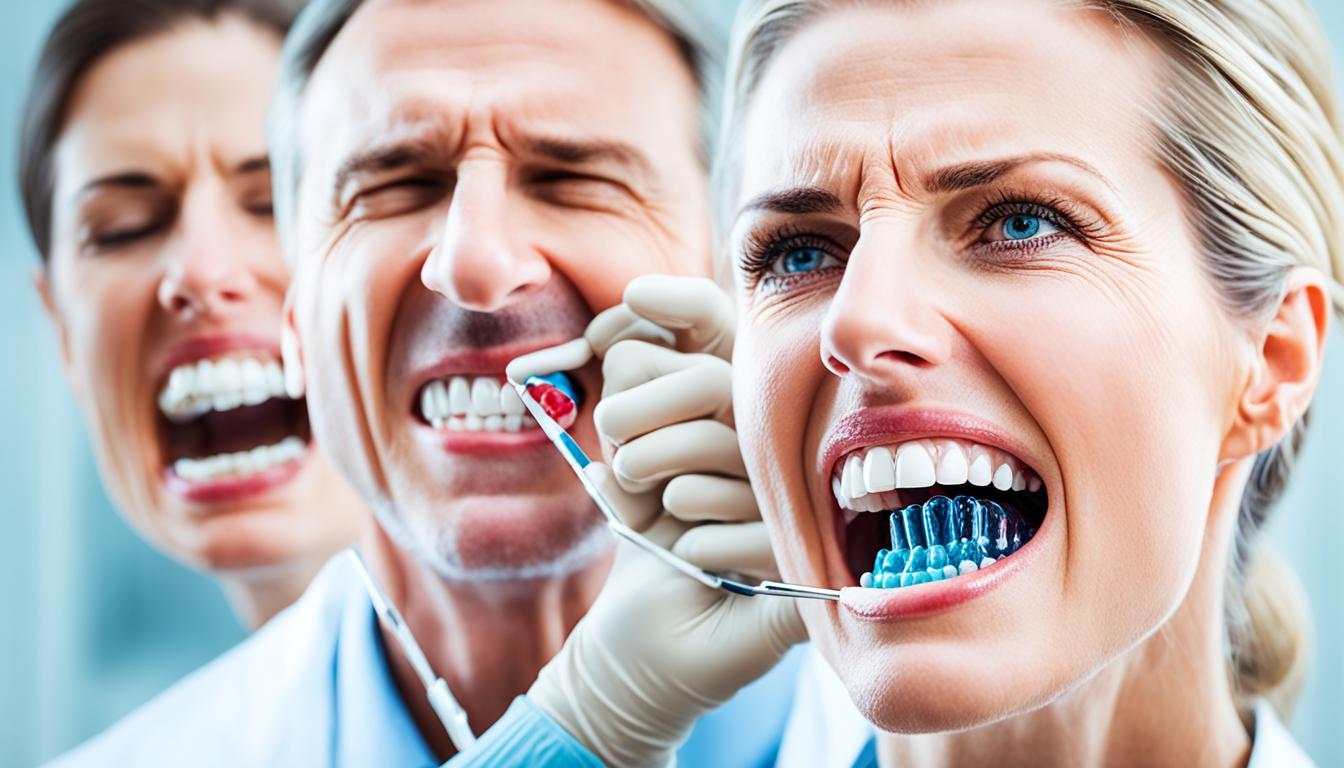Bruxism is when you grind or clench your teeth. This often happens during sleep. However, some people do it while they are awake. Sleep bruxism is more common. People may not know they do this as it’s involuntary. It happens throughout the night, about once a second each time.
This problem can cause damage to your teeth and jaw. It also may lead to jaw pain and issues with the TMJ. The cause of sleep bruxism is not clear. Many think it’s related to stress, genetic factors, and how you sleep. Lifestyle habits and some medications might also play a role. Because it happens when you’re not aware, finding out if you have it can be hard.
There are a few ways to help with bruxism. Managing stress is a key part of this. Using special dental devices, like night guards, can protect your teeth. For severe cases, some may look into stem cell therapy. This treatment is still being researched. It aims to fix damage in the jaw and around it.
Key Takeaways:
- Bruxism is a sleep-related movement disorder characterized by the involuntary grinding or clenching of teeth during sleep.
- Sleep bruxism can lead to dental issues, jaw pain, and complications with the temporomandibular joint (TMJ).
- The exact cause of sleep bruxism is not fully understood, but it is believed to be associated with factors such as stress, genetics, irregular sleep patterns, lifestyle habits, and certain medications.
- Diagnosing sleep bruxism can be challenging as it often goes unnoticed by the individual.
- Treatment options include stress management, dental devices such as night guards, and in severe cases, stem cell therapy may be considered.
Symptoms and Consequences of Sleep Bruxism
Sleep bruxism, or teeth grinding, brings some big symptoms and effects. It affects both teeth and jaws a lot. Knowing these signs helps catch sleep bruxism early and treat it right.
Symptoms of Sleep Bruxism
People with sleep bruxism clench and grind their teeth without knowing, while they sleep. This can lead to several dental problems, such as:
- Tooth damage: It can harm teeth by wearing them down, making them move, or breaking dental work.
- Jaw pain: The force from clenching and grinding can hurt your jaw and make it feel uncomfortable.
- Headaches: This can cause headaches by overworking the jaw muscles and the joints of the jaw.
- Facial muscle discomfort: Jaw movements during grinding can make facial muscles ache, feel tight, or get sore.
Often, people don’t notice the symptoms because they happen during sleep. If you suspect it or see these signs, don’t wait to talk to your dentist.
Consequences of Sleep Bruxism
Leaving sleep bruxism untreated can lead to serious outcomes over time. This might cause:
- TMJ dysfunction: It can strain the jaw joint, causing jaw pain, trouble chewing, and issues like jaw clicking or locking.
To avoid these problems and keep your mouth healthy, it’s good to treat sleep bruxism. With the right help, symptoms can lighten, and risks drop.
Diagnosis and Treatment of Sleep Bruxism
Finding out if you have sleep bruxism can be tough. It often goes unnoticed. To check for it, see a sleep or dental specialist.
They will ask you questions and look at your teeth. They might even want to watch you sleep. This is to figure out if you grind your teeth.
If needed, you might have to go to a sleep clinic. There, they will watch how your jaw moves at night. This can confirm if you have sleep bruxism and how bad it is.
After a diagnosis, there are several ways to treat sleep bruxism. Managing stress is a big help. You can do this through exercises or talking to a counselor.
Wearing a mouthguard at night can also help. A dentist can make one that fits your mouth perfectly. This guard protects your teeth from grinding.
In rare cases, standard treatments might not work. Then, some people explore stem cell therapy. This is a new method that uses your body’s own cells to heal the jaw.
This method is still being studied, so it’s not a common treatment yet. But it does show promise for the future.
FAQ
Q: What is bruxism?
A: Bruxism means grinding or clenching your teeth. It happens mostly at night when you sleep. This is a type of sleep disorder.
Q: What are the symptoms of sleep bruxism?
A: People with sleep bruxism grind or clench their teeth at night. This can lead to several problems like damaged teeth, jaw pain, headaches, and sore facial muscles.
Q: What are the consequences of sleep bruxism?
A: Sleep bruxism can harm your teeth, like wearing them down or causing damage. It might also affect any dental work you’ve had done. Another issue is TMJ dysfunction, where you find it hard to chew, feel chronic jaw pain, or hear noises when moving your jaw.
Q: How is sleep bruxism diagnosed?
A: A doctor or dentist might ask for self-reports or check your mouth for signs of wear. They could also watch you sleep at a clinic to see your jaw muscle activity at night.
Q: What are the treatment options for sleep bruxism?
A: Managing stress is key to treating bruxism. Practices like relaxation, counseling, and life changes can help. Dentists might also recommend wearing a night guard to protect your teeth while you sleep. In rare cases, stem cell therapy could be an option.

